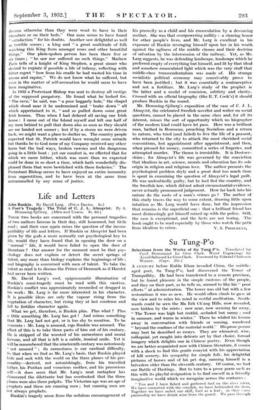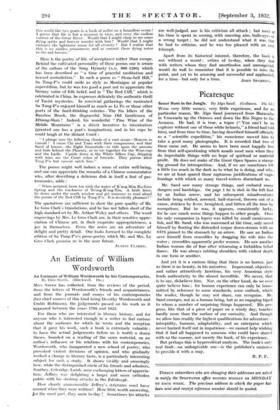Su Tung-P'o
Selections from the Works of Su Tung-P'o. Translated by Cyril Drummond Le Gros Clark. Wood Engravings by Averil Salmond Le Gros Clark. Foreword by Edward Chalmers Werner. (Cape. 21s.) A CENTURY before Kubla Khan invaded China, the middle- aged poet, Su Tung-P'o, had discovered the Tower of Tranquillity. He had been transferred to a remote province,. but he found pleasure in the simple customs of the people, and they on their part, as he tells us, seemed to like his poor efforts " at administration. The tower was old but with a few restorations it was as new. He would often climb to gaze at the view and to relax his mind in restful meditation. South- wards could be seen the Ma Erh Ch'ang Hills, now revealed, now hidden by the mists ; now near, now seeming far away.. " The Tower was high but restful, secluded but sunny ; cool in summer, and warm in winter." There he whiled his leisure
away in conversation with friends or musing, wandered " beyond the confines of the material world." Hisprosc poems may best be described as essays. They are whimsical, wise, colloquial, yet caught into delicate art by that choice, formal imagery which delights one in Chinese poetry. Even though we are better acquainted now with Chinese literature, it comes with a shock to find this gentle essayist with his appreciation of hill scenery, his sympathy for simple folk, his delightful
pictures of horses and of his pet dog, sunning himself in a belvedere older than the eleventh century. Of course, we had our Battle of Hastings. But to turn to a prose poem such as
this with its playful resignation is to find oneself in a friendly imaginative world which we recognize across the centuries :
" You and I have fished and gathered fuel on the river islets. We have consorted with the crayfish, we have befriended the deer. Together we have sailed our skiff, frail as a leaf ; in close eom. panionship we have drunk wine from the gourd. We pass through
this world like two gnats in a husk of millet on a boundless ocean ! I grieve that life is but a moment in time, and envy the endless current of the Great River. Would that I might clasp to me some flying sprite and forever wander with him ! Would that I might embrace the lightsome moon for all eternity ! But I realize that this is no sudden attainment, and so commit these dying notes to the sad breezes."
Here is the poetry of life, of acceptance rather than escape. Behind the cultivated personality of these poems one is aware of the culture of the Sung Dynasty (A.D. 960-1280) which has been described as " a time of peaceful meditation and inward assimilation." In such a poem as " Stone-bell Hill," Su Tung-P'o could smile as slyly as Montaigne at popular superstition, but he was too good a poet not to appreciate the literary value of folk belief, and in " The Red Cliff," which is celebrated in China, he expresses delicately the authentic thrill of Taoist mysteries. In convivial gatherings the rusticated Su Tung-P'o enjoyed himself as much as Li Po or those other poets of the hard-drinking coteries—The Six Idlers of the Bamboo Brook, the disgraceful Nine Old Gentlemen of HSiang-Shan ! Indeed, his wonderful " Pine Wine of the Middle Mountains " is a direct incentive to intoxication (granted one has a poet's imagination), and in his cups he could laugh at the distant Court :
" 1 plunge into the billowing clouds of a vast ocean—Heaven in tumult ! I cause Chi and Yuan with their companions, and that band of heroes—the Eight Immortals—to ride upon the unicorn and hide behind the Phoenix, or to vie together for the Wine-cup and the Ladle. Upside down is the White Silken Cap, dripping with wine are the Court robes of brocade. They pursue after Tung-P'o but cannot catch him."
The poems might well induce a sense of entire well-being, and one can appreciate the remarks of a Chinese commentator
who, after describing a delicious dish in itself a feat of gas- tronomics, adds :
When satiated, brew tea with the water of K'ang-Hou Ku-Lien Spring and the tea-leaves of Ts'eng-K'eng-Tou. A little later, lie clown under the north window and get someone to read aloud the poems of the Red Cliff by Tung-P'ci. It is decidedly pleasant!"
The quotations are sufficient to show the pure quality of Mr. Le Gros Clark's translations, and he has not fallen short of the high standard set by Mr. Arthur Waley and others. The wood engravings by Mrs. Le Gros Clark are, in their sensitive appre- ciation of Chinese art, in their exquisite appropriateness, a joy in themselves. Even the notes are an adventure of delight and pretty detail. One looks forward to the complete edition of Su Tung-P'o's prose-poetry which Mr. and Mrs. Le Gros Clark promise us in the near future.
AUSTIN CLARKE.































 Previous page
Previous page